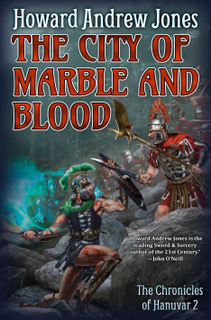
Howard Andrew Jones is joining us today to talk about his novel, The City of Marble and Blood. Here’s the publisher’s description:
Gladiators, legionnaires, scheming sorcerers, and dark gods had battered Hanuvar but not stopped him. The great Volani general now returns to the land of his enemies!
Hanuvar had pledged to find the remnants of his people, scattered into slavery across the whole of the peninsula. This time he had no army to help him. His would be a stealthy war of liberation, buying the freedom of some and arranging for the escape of others, aided only by a young playwright, the daughter of a hated political rival, the tattered remnants of his old spy network, and the unlikeliest ally of all, the general who had once defeated him.
Arrayed against them were the mighty legions, the sorcerous revenants, and the wily Metellus of the Praetorian guard, ever alert to seize advantage. To add to their troubles, someone was drawing unwanted attention to the helpless Volani slaves by murdering influential Dervans and leaving the sign of the sacred Eltyr corps beside their bodies. Someone who might well be Hanuvar’s lost daughter, who’d fought her way from captivity and was even now being hunted through the countryside.
Worst of all, a magical attack had left Hanuvar with a lingering curse that might change him forever . . . or lead him to an early grave.
What’s Howard’s favorite bit?

Two of the things I like best about this book is that A.) I’ve never had more fun writing, and B.) a publisher was interested in it. It took so many steps different from the popular fantasy doorstoppers I worried no one would want to print it. It’s set not in faux medieval times, but in an ancient Mediterranean analog. The main character’s not a young man thrust reluctantly into adventure and struggling to understand his powers. He’s seasoned and experienced and while you get to know his backstory, there’s no slow origin to wait through before things get underway. You start with Hanuvar in late middle age.
Hanuvar’s not out to prove anything and he doesn’t need to find himself or quest to stop a dark lord’s power. For him, the only thing that matters are his people. When the Dervan Empire came for the city of Volanus, its people fought block by block, house by house, until most fell with their swords in hand. Only a thousand or so survived to be led away in chains.
The city’s treasuries were looted, its temples were defiled, and then, to sate their emperor’s thirst for vengeance, the empire’s mages cursed Volanus and sowed its fields with salt. They overlooked only one detail: Hanuvar, the greatest Volani general, had escaped alive. Against the might of a vast empire, Hanuvar has only an aging sword arm, a lifetime of wisdom… and the greatest military mind in the world, set upon a single goal. No matter where they’ve been sent, from the festering capital to the furthest outpost of the Dervan Empire, Hanuvar will find his people. Every last one of them. And he will set them free.
Like the book that precedes it, The City of Marble and Blood is structured a little like a modern television series in that it consists of individual episodes that are complete in themselves, but that build upon one another so that major arcs take several episodes to resolve. Characters return and long running secrets are resolved and then the book concludes with a kind of season finale.
And this sequential approach is probably my favorite bit from the whole thing. While I admit to enjoying some slower paced fantasy novels, I’ve become too impatient to write that way. I like to get the reader straight to the story, all fourteen interconnected ones that make up its structure. Building the book this way became an enjoyable challenge – I had to craft each chapter/episode so that it could stand alone, but be more rewarding if read in order, and more revealing of ongoing events if presented in sequence. I hoped readers would respond to a story they could enjoy in bite-sized helpings.
Another aspect I like about this episodic structure is my ability to vary the tone and approach of each individual chapter. Some are straight up adventure tales and some have strong elements of horror. Some are heists or capers and some have strong comic elements. As is probably clear from the covers, there’s a lot of sword play. But like a strong Trek episode, I’d like to think that there’s more going on under the hood if you care to think about it. Inspired as it is by our Punic Wars, this series faces off against a lot of horrors of our own making – genocide, slavery, misogyny, prejudice, fascism, fanaticism, amongst other things, although hopefully the tales can be enjoyed simply as adventures. My hope is that I don’t slam down so loudly on the anvil of the message that the sound drowns out the story and the characters themselves.
As always, I remain fascinated with heroism, which crops up again and again in my fiction. I enjoy reading about grimdark protagonists, but I keep returning to write about characters who stand up and do the right thing even against tremendous odds. We so often see men and women motivated by self interest, both in fiction and in the real world, that those who are truly selfless inspire me. Hanuvar is a man of great integrity and honor, one so dedicated to his cause he’s not only ready to die for it, he’s just about certain he will. I’ve seen some strange accusations over the years that this or that character of mine is a self-insert, and it would be as wrong to assume here as before. I’d never want to be this man, who has lost everything, and lives with deep-seated survivor’s guilt. But I’d certainly like to meet a few people out there in the real world with his code of ethics and dedication to others. And I wouldn’t mind being as clear-eyed as he when facing challenges.
LINKS:
BIO:
Howard Andrew Jones’s new sword-and-sorcery series debuted in 2023 from Baen, starting with Lord of a Shattered Land, continuing with The City of Marble and Blood. His Ring-Sworn trilogy, beginning with For the Killing of Kings, was critically acclaimed by Publisher’s Weekly. His debut historical fantasy novel, The Desert of Souls, was praised by influential publications like Library Journal, Kirkus, and Publisher’s Weekly. Its sequel, The Bones of the Old Ones, made the Barnes and Noble Best Fantasy Release of 2013 and received a starred review from Publisher’s Weekly. He is the author of four Pathfinder novels, numerous short stories, and assembled and edited 8 collections of Harold Lamb’s work for the University of Nebraska Press. He served as Managing Editor of Black Gate magazine from 2004 until 2018, and is Managing Editor of the sword-and-sorcery magazine Tales From the Magician’s Skull, published by Goodman Games.
